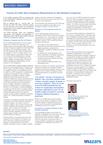Finance Act 2020; New Compliance Requirements for Non-Resident Companies
A non-resident company (NRC) is a company that is not incorporated in Nigeria but derives income or profits from Nigeria.
With an effective date of 1 January 2021, the Finance Act 2020 (“FA 2020”) amended existing tax and fiscal laws and created new compliance requirements for non-resident companies carrying on business in Nigeria.
This article discusses these new compliance requirements and highlights the deployment of technology by the Federal Inland Revenue Service (“FIRS”) to automate tax collection.
Obligation to Register and File VAT Returns
The FA 2020 amended section 10 of the Value Added Tax Act which now mandates a non-resident person making taxable supply of goods or services to Nigeria to register for tax with the FIRS and obtain a Tax Identification Number (“TIN”). The TIN obtained is also valid for fulfilling all the tax obligations of the non-resident person. The non-resident person is expected to include VAT on its invoice for all taxable goods or services made in Nigeria. The non-resident person that makes a supply of taxable goods or services in Nigeria may appoint a representative, for the purpose of its tax obligations.
The FA 2020 defines a taxable supply of goods as goods that are physically present in Nigeria at the time of supply, imported into Nigeria, assembled or installed in Nigeria, or the beneficial owner of the rights in or over the goods is a taxable person in Nigeria and the goods or right is situated, registered or exercisable in Nigeria. Similarly, taxable services can be seen as services rendered in Nigeria by a person physically present in Nigeria at the time of providing the service or the service is provided to and consumed by a person in Nigeria, regardless of whether the service is rendered within or outside Nigeria or whether or not the legal or contractual obligation to render such service rests on a person within or outside Nigeria, or the service is connected with existing immovable property (including the services of agents, experts, engineers, architects, valuers, etc.), where the property is located in Nigeria.
Previously, non-resident companies were required to register for VAT only if they were carrying on business in Nigeria. The phrase “carries on business in Nigeria” has now been replaced with “makes a taxable supply of goods or services to Nigeria”. Also, by virtue of the FA 2020 amendments, the criteria for registration and taxation has been expanded to cover for all taxable supply of goods or services to Nigeria whether physical or electronic.
Notwithstanding, non-resident persons are still required to use the address of the person with whom they have a subsisting contract for the purpose of correspondence with the FIRS. Nigerian companies to whom a supply of taxable goods or services is made are still required to withhold VAT and remit same to the FIRS in the currency of the transaction.
The amendment also provides that the FIRS may issue further guidelines to give effect to the provisions of section 10 of the VAT Act.
Obligation to File Companies Income Tax Returns
The FA 2020 amended section 55 of the Companies Income Tax Act (CITA) by inserting a new subsection (1A). This requires non-resident companies that are taxable in Nigeria under the provision of section 13(2) to submit tax returns containing the following:
- the company’s full audited financial statements and the financial statements of the Nigerian operations, attested by an independent, qualified or certified accountant in Nigeria;
- tax computation schedules based on the profits attributable to its Nigerian operations;
- a true and correct statement, in writing, containing the amount of profits from every source in Nigeria; and
- duly completed Companies Income Tax Assessment Form.
Based on the above, non-resident companies are expected to submit their full audited financial statements as well as the Nigerian accounts. This applies to all non-resident companies whether with physical presence or significant economic presence.
Where a non-resident person earns passive income such as interest, royalties etc. from its business dealings in Nigeria, filing of annual income tax returns would not be applicable as withholding tax will be the final tax.
Introduction of e-Payment Platform for Non-Resident Companies
The unprecedented effect of the COVID-19 pandemic is reshaping the normal way of revenue collection and filing of various tax related documents by the tax authority in Nigeria. The FIRS are duty-bound to restructure ways of revenue collection considering the new normal introduced by the outbreak of the COVID-19 pandemic.
As a result, the FA 2020 introduced an e-system where the FIRS may deploy any proprietary or third-party payment platform to collect and remit taxes due on digital transactions with a Nigerian resident. The service may also adopt this method in automating the tax administration process including tax assessment and information gathering provided it gives a 30-day notice to the taxpayer.
This newly introduced platform would afford the tax authority a seamless effort in collecting taxes due on digitalized business activities. One of the challenges that may be faced using this platform is the potential weaknesses that may be exploited by hackers who may want to gain access into the system. This can cause a great loss to the taxpayers and may further taxpayers’ trust in the tax authority.
Conclusion
The FA 2020 amendments have increased the compliance requirements of non-resident companies having business dealings in Nigeria. It is expected that taxable non-resident companies file their tax returns alongside all the required documents except in circumstances where withholding tax suffered is the final tax; the company will not have any obligation to file companies income tax return in Nigeria in respect of that year. It is also required of non-resident companies making taxable supply of goods or services to Nigeria to register for tax with the FIRS and obtain a Tax Identification Number (TIN). Therefore, it is important that non-resident persons appoint tax experts to ease the compliance process.

